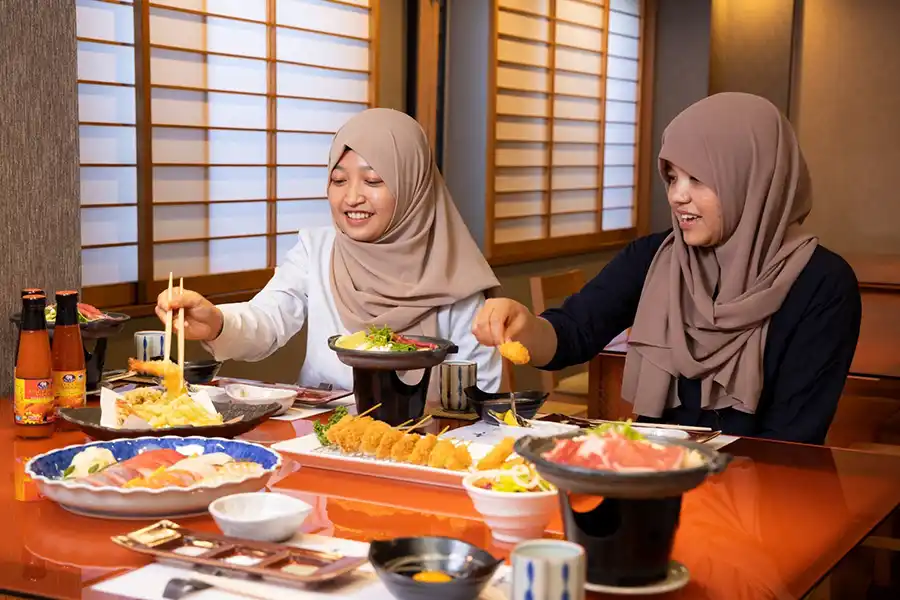Discovering Halal-Certified Restaurants in Osaka: A Muslim Traveler’s Culinary Journey

Osaka, Japan’s vibrant culinary capital, pulses with energy. The neon-lit streets of Dotonbori, the sizzle of takoyaki stalls, and the chatter of locals create a sensory symphony that’s hard to resist. For Muslim travelers, though, navigating this food paradise can feel daunting. Will that mouthwatering okonomiyaki be halal? Is there a place to enjoy ramen without compromising dietary beliefs? I’ve been there—standing in a bustling Osaka alley, craving authentic Japanese cuisine but unsure where to turn. The good news? Osaka is becoming a haven for Muslim-friendly dining, with halal-certified restaurants offering everything from sushi to wagyu beef. In this guide, I’ll take you on a journey through Osaka’s halal dining scene, sharing personal insights, expert tips, and actionable advice to make your trip unforgettable.
Why Halal Dining Matters for Muslim Travelers
Halal dining is more than a dietary choice—it’s a reflection of faith, culture, and identity. For Muslims, adhering to Islamic dietary laws means avoiding pork, alcohol, and non-halal meat while ensuring food is prepared in a way that prevents cross-contamination. In Japan, where pork-based tonkotsu ramen and mirin-seasoned dishes are staples, finding halal options can be tricky. Yet, Osaka’s growing Muslim-friendly infrastructure is changing the game. According to the Japan National Tourism Organization, the country welcomed over 1.5 million Muslim visitors in 2019, prompting restaurants to adapt. My first trip to Osaka left me skeptical, but discovering halal-certified spots transformed my experience, letting me savor Japan’s flavors without worry.
The Rise of Halal-Certified Restaurants in Osaka
Osaka’s halal dining scene has blossomed in recent years, driven by global tourism and local innovation. Restaurants now proudly display halal certifications from organizations like the Japan Islamic Trust, ensuring authenticity. From traditional Japanese eateries to international cuisines, the city offers diverse options. I recall wandering near Osaka Castle, stomach rumbling, when I stumbled upon a halal ramen shop. The aroma of beef bone broth was a revelation—no pork, no compromise, just pure deliciousness. This growth isn’t just about food; it’s about inclusivity. Establishments are adding prayer spaces, Qibla markers, and non-alcoholic menus, making Osaka a welcoming destination for Muslim travelers.
Understanding Halal Certification in Japan
Halal certification in Japan is rigorous, ensuring compliance with Islamic standards. Certifying bodies verify that ingredients are halal, utensils are separate, and kitchens are free from cross-contamination. Some restaurants, like those listed on Halal Gourmet Japan, go further, employing Muslim chefs or owners to instill confidence. During my travels, I learned to look for certification labels or ask staff about preparation methods. Pro tip: Apps like Halal Navi can help you verify a restaurant’s status in real time, saving you from guesswork.
 Where Locals Eat Okonomiyaki in Osaka: A Deep Dive into Osaka’s Soul Food Scene
Where Locals Eat Okonomiyaki in Osaka: A Deep Dive into Osaka’s Soul Food SceneTop Halal-Certified Restaurants in Osaka
Let’s dive into the heart of Osaka’s halal dining scene. These restaurants, handpicked for their authenticity and quality, offer a taste of Japan and beyond. Each combines flavor, ambiance, and Muslim-friendly amenities to create memorable experiences.
1. Chibo Diversity Dotonbori: Sizzling Okonomiyaki Bliss
Nestled in the heart of Dotonbori, Chibo Diversity is a must-visit for okonomiyaki lovers. This halal-certified branch of the iconic Chibo chain serves savory pancakes made with halal ingredients and Otafuku sauce, free from pork or alcohol. I sat at a teppan grill, watching chefs flip golden okonomiyaki, the aroma making my mouth water. The restaurant also offers yakisoba and teppanyaki with halal wagyu beef, plus a prayer room for added convenience.
- Must-Try Dish: Chibo-yaki okonomiyaki (¥1,900)
- Location: 1 Chome-5-5 Dotonbori, Chuo Ward
- Hours: 11 AM–10 PM
- Why Visit: Authentic Osaka street food with a Muslim-friendly twist
2. Ramen Honolu Namba: Slurp-Worthy Halal Ramen
Ramen Honolu in Namba is a game-changer for Muslim ramen fans. Certified halal, it uses chicken and beef bone broth, halal noodles, and soy sauce free from alcohol. My first bowl of Spicy Akaou ramen was a revelation—rich, fiery, and soul-warming. The cozy setting and English menu make it approachable, while its proximity to Namba Station is perfect for travelers. Check out Halal Food in Japan for more on their menu.
- Must-Try Dish: Spicy Akaou ramen (¥1,200)
- Location: 2 Chome-5-27 Motomachi, Naniwa Ward
- Hours: 11 AM–9 PM
- Why Visit: Osaka’s first halal ramen experience
3. Ali’s Kitchen: A Pakistani-Arabic Oasis
For a break from Japanese cuisine, Ali’s Kitchen near Shinsaibashi delivers Pakistani and Arabic flavors. This Michelin-recognized spot, run by a Muslim owner, serves halal Kobe wagyu biryani, kebabs, and lahmacun. I savored their spicy lamb curry in a private room with Middle Eastern decor, feeling transported to Lahore. The Friday buffet is a steal for groups.
- Must-Try Dish: Beef biryani (¥1,500)
- Location: Shinsaibashi, Chuo Ward
- Hours: 11 AM–3 PM, 5 PM–10 PM
- Why Visit: Diverse South Asian and Middle Eastern menu
4. Matsuri: Japanese Classics, Halal-Style
Matsuri in Fukushima-ku is a gem for halal Japanese cuisine. Offering ramen, okonomiyaki, and takoyaki, it’s certified halal and features a prayer space. My takoyaki, made with halal octopus, was crispy outside, creamy inside—a true Osaka treat. The staff’s warmth made me feel at home. Visit Food Diversity for more on Matsuri’s offerings.
 Slurping After Sunset: The Best Late-Night Ramen Shops Near Osaka Station
Slurping After Sunset: The Best Late-Night Ramen Shops Near Osaka Station- Must-Try Dish: Halal takoyaki (¥800)
- Location: 3-27-17 Yoshino, Fukushima-ku
- Hours: 11 AM–2 PM, 5 PM–12 AM
- Why Visit: Local favorites with Muslim-friendly preparation
5. Cafe Bintang:“Javanese and Malaysian Delights
Near Shinsaibashi, Cafe Bintang is a Muslim-owned spot serving Indonesian and Malaysian dishes. Their nasi goreng and gado gado are bursting with flavor, and the cozy ambiance is perfect for a relaxed meal. I loved their falooda dessert—a sweet end to a spicy meal. It’s a great spot for Southeast Asian cuisine lovers.
- Must-Try Dish: Nasi goreng (¥1,200)
- Location: Shinsaibashi, Chuo Ward
- Hours: 11 AM–10 PM
- Why Visit: Authentic Southeast Asian flavors
Comparing Osaka’s Halal Dining Options
To help you choose, here’s a comparison of the top halal-certified restaurants in Osaka, highlighting key features.
| Restaurant | Cuisine | Signature Dish | Price Range | Prayer Space | Location | Certification |
|---|---|---|---|---|---|---|
| Chibo Diversity | Japanese (Okonomiyaki) | Chibo-yaki (¥1,900) | ¥1,000–¥3,000 | Yes | Dotonbori | Japan Islamic Trust |
| Ramen Honolu | Japanese (Ramen) | Spicy Akaou (¥1,200) | ¥800–¥2,000 | No | Namba | Halal-Certified |
| Ali’s Kitchen | Pakistani/Arabic | Beef biryani (¥1,500) | ¥1,000–¥2,500 | Yes | Shinsaibashi | Halal-Certified |
| Matsuri | Japanese (Various) | Halal takoyaki (¥800) | ¥800–¥2,500 | Yes | Fukushima-ku | Halal-Certified |
| Cafe Bintang | Indonesian/Malaysian | Nasi goreng (¥1,200) | ¥800–¥2,000 | No | Shinsaibashi | Muslim-Owned |
Navigating Osaka’s Halal Dining Scene: Tips and Tricks
Finding halal food in Osaka is easier than ever, but a little preparation goes a long way. Here are expert tips to enhance your dining experience:
- Use Apps and Websites: Halal Gourmet Japan and Halal Navi list halal restaurants and prayer spaces. I used these apps to find Matsuri while exploring Fukushima-ku.
- Check Certifications: Look for labels from trusted bodies like the Japan Islamic Trust. If unsure, ask about ingredient sourcing or kitchen practices.
- Plan Ahead: Some restaurants, like Ukihashi, require reservations for halal menus. Call ahead to avoid disappointment.
- Explore Non-Japanese Options: Osaka’s Indian, Pakistani, and Turkish restaurants often offer halal menus, adding variety to your trip.
- Vegetarian Fallback: If halal options are scarce, vegetarian dishes are usually safe, but confirm no alcohol or non-halal broths are used.
Cultural Nuances and Dining Etiquette
Dining in Japan is an experience steeped in tradition. For Muslim travelers, understanding local customs can enhance your interactions. Bow slightly when greeting staff, avoid loud conversations, and use chopsticks respectfully. I once fumbled with chopsticks at Chibo, but the staff kindly showed me the ropes. Many halal restaurants offer English menus and are accustomed to international guests, so don’t hesitate to ask questions. If praying, use the restaurant’s prayer space or ask for a quiet corner—most are accommodating.
Beyond Food: Muslim-Friendly Amenities in Osaka
Osaka’s halal restaurants often go beyond food, offering prayer rooms, Qibla markers, and wudu facilities. Chibo Diversity and Matsuri, for instance, have dedicated prayer spaces, making it easy to balance dining and worship. The Osaka Masjid, located in Nishiyodogawa Ward, is a hub for Muslim travelers, offering prayer times and community events. I visited the mosque after dining at Ali’s Kitchen, finding comfort in its serene atmosphere. Some hotels, like those listed on Japan Muslim Guide, also provide halal breakfasts and prayer mats.
 Affordable Sushi Restaurants in Osaka: A Tourist’s Guide to Japan’s Culinary Capital
Affordable Sushi Restaurants in Osaka: A Tourist’s Guide to Japan’s Culinary CapitalChallenges and Solutions for Muslim Diners
Despite progress, challenges remain. Some “Muslim-friendly” restaurants serve alcohol or use shared kitchens, risking cross-contamination. During my trip, I encountered a restaurant claiming to be halal but using mirin in their sauces. Always verify certifications or ask detailed questions. Language barriers can also complicate communication, so learning basic Japanese phrases like “Halal desu ka?” (Is it halal?) helps. If dining options are limited, supermarkets like Aeon stock halal frozen meats, allowing you to cook your own meals.
FAQ: Your Halal Dining Questions Answered
Is it easy to find halal food in Osaka?
Yes, Osaka has a growing number of halal-certified restaurants, especially in tourist areas like Dotonbori and Shinsaibashi. Use apps like Halal Navi to locate them.
What types of cuisine are available?
You’ll find halal Japanese (ramen, okonomiyaki, sushi), Pakistani, Indian, Arabic, Indonesian, and Malaysian dishes, catering to diverse tastes.
Are prayer facilities common in restaurants?
Many halal restaurants, like Chibo and Matsuri, offer prayer spaces. Others are near mosques like Osaka Masjid.
How can I verify a restaurant’s halal status?
Check for certifications from bodies like the Japan Islamic Trust or use Halal Gourmet Japan. Ask about ingredients and kitchen practices if unsure.
 Discovering the Best Places to Shop Japanese Skincare in Osaka 2025
Discovering the Best Places to Shop Japanese Skincare in Osaka 2025What if I can’t find halal options?
Opt for vegetarian or seafood dishes, but confirm they’re free from alcohol or non-halal broths. Supermarkets also sell halal products.
Conclusion: Savoring Osaka’s Halal Delights
Osaka’s halal dining scene is a testament to the city’s embrace of diversity. From the sizzle of Chibo’s okonomiyaki to the spicy warmth of Ali’s Kitchen’s biryani, Muslim travelers can indulge in authentic flavors without compromising their faith. My journey through Osaka’s streets taught me that food is a universal language, bridging cultures and creating memories. Whether you’re slurping ramen at Honolu or praying at Osaka Masjid, this city welcomes you with open arms. Plan your trip, download Halal Navi, and dive into Osaka’s culinary wonders. Your taste buds—and your heart—will thank you.
What’s next? Share your favorite halal dining experiences in the comments or explore more Muslim-friendly destinations in Japan. Happy travels, and bon appétit!

Deja una respuesta